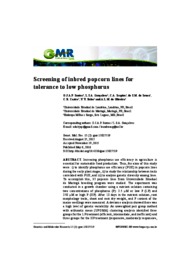Screening of inbred popcorn lines for tolerance to low phosphorus.
Screening of inbred popcorn lines for tolerance to low phosphorus.
Author(s): SOUSA, S. M. de
Summary: Increasing phosphorus use efficiency in agriculture is essential for sustainable food production. Thus, the aims of this study were: i) to identify phosphorus use efficiency (PUE) in popcorn lines during the early plant stages, ii) to study the relationship between traits correlated with PUE, and iii) to analyze genetic diversity among lines. To accomplish this, 35 popcorn lines from Universidade Estadual de Maringá breeding program were studied. The experiment was conducted in a growth chamber using a nutrient solution containing two concentrations of phosphorus (P): 2.5 ?M or low P (LP) and 250 ?M or high P (HP). After 13 days in the nutrient solution, root morphology traits, shoot and root dry weight, and P content of the maize seedlings were measured. A deviance analysis showed there was a high level of genetic variability. An unweighted pair group method with arithmetic mean (UPGMA) clustering analysis identified three groups for the LP treatment (efficient, intermediate, and inefficient) and three groups for the HP treatment (responsive, moderately responsive, and unresponsive). The results of a principal component analysis and selection index were consistent with the UPGMA analysis, and lines 1, 2, 13, 17, 26, and 31 were classified as PUE.
Publication year: 2016
Types of publication: Journal article
Unit: Embrapa Maize & Sorghum
Keywords: Estresse abiótico, Fósforo, Pipoca, WinRHIZO
Observation
Some of Embrapa's publications are published as ePub files. To read them, use or download one of the following free software options to your computer or mobile device. Android: Google Play Books; IOS: iBooks; Windows and Linux: Calibre.
Access other publications
Access the Agricultural Research Database (BDPA) to consult Embrapa's full library collection and records.
Visit Embrapa Bookstore to purchase books and other publications sold by Embrapa.

